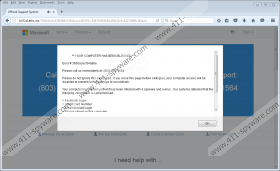Please call us immediately at: (803) 702-1564 Removal Guide
Please call us immediately at: (803) 702-1564 is yet another annoying fake alert that has just hit the web. Similarly to its peers, including “0800-014-8604 Pop-Up” and “+1-800-236-1513,” this fake alert also pretends to be an urgent security-related issue with your Windows Operating System and offers you a toll-free phone number ((803) 702-1564) that you are pushed to call “immediately.” You are also promised to talk to certified technicians who can help you fix your computer, but, unfortunately, this is also not true and you will only talk to a sales person trying to sell you some redundant service or software. The good news is that the alleged infection and error claimed by this alert are all fake. Therefore, you can remove Please call us immediately at: (803) 702-1564 without any unfortunate consequences.
This fake alert is displayed on your screen when you get redirected to ts072a14t8a.site. This redirection can simply come from your clicking on a corrupt third-party ad or link you may be presented with on a malicious website, but it is also possible that there are adware programs on your system that can redirect you there when you click on ads generated by them. When your computer is not protected by an up-to-date malware removal tool, you need to be extra careful every time you surf the web due to the ever-growing number of questionable third-party contents.
It is possible that you simply want to run a web search on a free application you would like to download and install. However, the results your search engine returns with may contain links to fake websites set up by cyber criminals in order to promote malicious bundles. Clicking on any content on such a site can easily redirect you to this fake alert page. This is why it is important that you only download software as well as updates from official and reputable websites. It is very easy to click on the wrong content when you land on unfamiliar pages.
You may not have realized but suspicious file-sharing sites display several download buttons while other questionable news sites display fake next-page and previous-page buttons as well as fake system notifications and updaters. If you click on these, you may drop a malicious bundle onto your system and let a bunch of adware threats, browser hijackers, Trojans, and other infections on board, but you may as well be redirected to malicious pages such as this fake alert. In order to be on the safe side, we recommend that you scan your system with a proper malware scanner tool after you delete Please call us immediately at: (803) 702-1564 from your system.
This fake alert pops up on your screen right after you click on corrupt content or a malware infection redirects you to this malicious page (ts072a14t8a.site). This alert claims that your computer has been blocked due to the made-up reason that it “has been infected with a spyware and a virus.” You are even shown a fake error ID to make it look more authentic, let alone the fact that the webpage below this pop-up alert window looks like a Microsoft technical support page, which, by the way, promotes the same telephone number as this pop-up. You are made to believe that your passwords and other personal information could be in danger and pushed to call (803) 702-1564 immediately.
However, when you call this number, you will be talked into purchasing a system fixing service or application that may not work at all since this is all just a scam. If you do not want to share your personally identifiable information or provide remote control to these alleged “technicians” we simply call potential “schemers,” you should act right now and remove Please call us immediately at: (803) 702-1564 from your computer along with all possibly related and unrelated malware infections as well.
In order to be able to eliminate this fake alert, you need to find all suspicious programs you may have installed recently. For this, you can scan through your list of installed programs in Control Panel and uninstall any shady application you may find there. Moreover, you can also reset all your browsers to make sure that no suspicious browser extensions remain. These steps would most likely take care of this annoying fake alert. So, if you do not mind a bit of manual work, you can follow our instructions below. Nonetheless, there is a more effective way for you to tackle this and all kinds of different malware attacks. You can install a reliable anti-malware program, for example, SpyHunter, that will automatically defend your computer from all possible threats.
Remove Please call us immediately at: (803) 702-1564 from Windows
Windows XP
- Access the Start menu and go to Control Panel.
- Choose Add or Remove Programs.
- Select the suspicious program and click Remove.
Windows Vista and Windows 7
- Click the Windows button on the Taskbar and select Control Panel.
- Click Uninstall a program.
- Select the suspicious program and click Uninstall.
Windows 8, Windows 8.1, and Windows 10
- Press Win+X and select Programs and Features.
- Select the suspicious program and click Uninstall.
Remove Please call us immediately at: (803) 702-1564 from your browsers
Mozilla Firefox
- Press Alt+H and select Troubleshooting Information.
- Press Refresh Firefox and click Refresh Firefox in the pop-up window.
Google Chrome
- Press Alt+F and go to Settings.
- At the bottom, click Show advanced settings.
- At the bottom, click Reset settings.
- Click Reset in the pop-up window.
Internet Explorer
- Press Alt+T and choose Internet Options.
- On the Advanced tab, click the Reset button.
- Select the Delete personal settings checkbox and click Reset.
- Press Close.
Please call us immediately at: (803) 702-1564 Screenshots:


